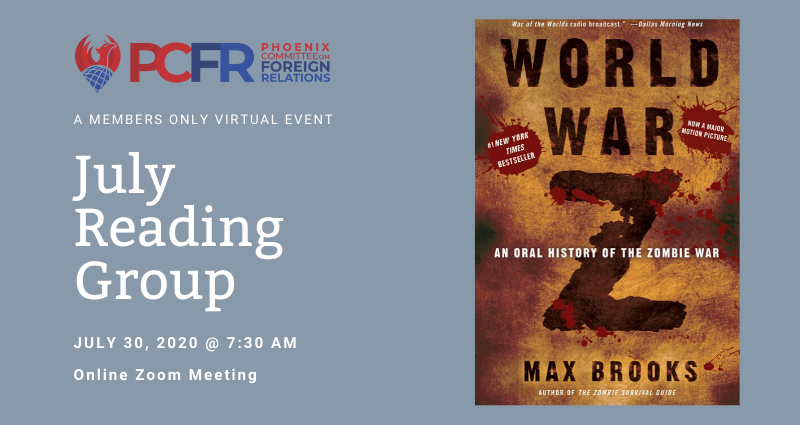
July Reading Group
World War Z, An Oral History of the Zombie War
by Max Brooks
Thursday, July 30, 2020
7:30 - 9:00 am
Venue
Online Zoom Meeting.
Topic of Discussion
When I asked Keith Brown, Professor of the School of Politics and Global Studies at ASU, for a reading suggestion for our next PCFR book group discussion, I was a bit surprised when he recommended a science-fiction novel about zombies, written by the son of Mel Brooks and Anne Bancroft, Max Brooks. Specifically, Keith proposed the 2006 New York Times bestseller World War Z, An Oral History of the Zombie War. The book also inspired the 2014 Hollywood film version, with Brad Pitt in the central role of a United Nations epidemiologist, tracking down the origin of the pandemic to try to save humanity.
Keith also told me that he has used this book in international relations and global studies classes at Brown and at ASU, so I asked him to provide some further context: this is what he offered.
In various interviews, Max Brooks has spoken about his childhood fascination with the logistics of survival in horror films. Before this novel, he published The Zombie Survival Guide, an earnest spoof of survivalist literature in which he emphasizes the importance of securing water, food and medical supplies as well as weapons if and when a government and society are brought down by a disaster that no-one has prepared for. In World War Z, Brooks writes from the point of view of a United Nations researcher conducting an after-action report, on how a global pandemic began, spread, and was eventually overcome. Written in the genre of oral history—composed of imagined interviews with survivors on all five continents (as well as astronauts, who were in orbit when the pandemic began—World War Z was a commercial success. It also attracted interest from the US military as they emphasized disaster preparedness as part of their mission. Brooks’ contributions are discussed in this 2013 article, which states that “Speculative Fiction is the new Military Intelligence.”
Now in the face of the Covid-19 pandemic, Brooks’ book is attracting attention again. Brooks was interviewed recently by Terri Gross on NPR. The zombie—the untiring, unthinking enemy that cannot be frightened or killed, but can only be overcome by ingenuity, perseverance, and broad collaboration—can stand for a virus. And the themes that Brooks discusses—governments refusing to share information on the scale of the outbreak; unscrupulous entrepreneurs cashing in on people’s fear; leaders facing impossible ethical challenges over whom to save and whom to sacrifice; the collapse of whole economic sectors (commercial aviation, marketing) and of global supply chains; the role of history and geography, as well as political system, in shaping the course of the pandemic—all have additional resonance at this time.
I have used the book in classes. The sections I used most recently, this semester, were
- the chapters with the conman and the former White House chief of staff, who sold “Phalanx”—an untested, unproven antidote to the virus—to make a fortune, and make the US public think the pandemic was under control (pp.54-63). One student responded to this section, from way back in 2015, with this reflection.
- the chapters on the South African “Rediker plan” which eventually all countries adopted, which required sacrificing part of the population in order to use limited resources to save as many as possible; and the psychological cost for the leaders who had to take those decisions (105-116)
- the chapter on the international summit (and US leadership) at which, against resistance by those countries less impacted by the virus, the surviving governments vote to go on the offensive (264-269)
We hope you’ll find the book as compelling and thought-provoking as the readers who made it a best-seller; and the military professionals, NPR journalists and undergraduate students who have found it useful to think about disaster preparedness, societal and global values and priorities, and the role of government.
We will kick off the discussion by asking which of the fictional interviews in the book you found most provocative or informative, and why?
Look forward to seeing you all!
Phil Abruzino
